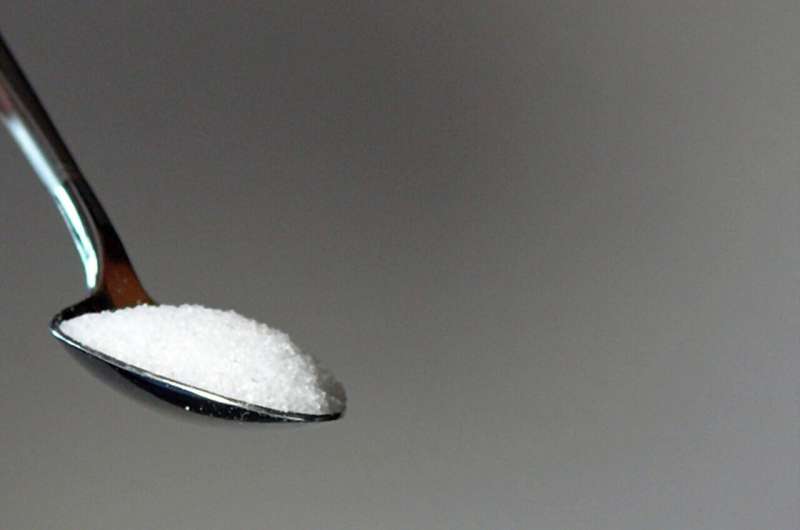This article has been reviewed according to Science X's editorial process and policies. Editors have highlighted the following attributes while ensuring the content's credibility:
fact-checked
peer-reviewed publication
trusted source
proofread
Do sweeteners increase your appetite? New evidence from randomized controlled trial says no

Replacing sugar with artificial and natural sweeteners in foods does not make people hungrier—and also helps to reduce blood sugar levels, a new study has found.
The double-blind randomized controlled trial found that consuming food containing sweeteners produced a similar reduction in appetite sensations and appetite-related hormone responses as sugary foods—and provides some benefits such as lowering blood sugar, which may be particularly important in people at risk of developing type 2 diabetes.
The use of sweeteners in place of sugar in foods can be controversial due to conflicting reports about their potential to increase appetite. Previous studies have been carried out but did not provide robust evidence.
However, the researchers say their study, which meets the gold standard level of proof in scientific investigation, provides very strong evidence that sweeteners and sweetness enhancers do not negatively impact appetite and are beneficial for reducing sugar intake.
The University of Leeds led the trial in collaboration with the Rhône-Alpes Research Center for Human Nutrition. It is the latest study to be published by the SWEET consortium of 29 European research, consumer, and industry partners, which is working to develop and review evidence on long-term benefits and potential risks involved in switching over to sweeteners and sweetness enhancers in the context of public health and safety, obesity, and sustainability.
Lead author Catherine Gibbons, Associate Professor at the University of Leeds' School of Psychology, said, "Reducing sugar consumption has become a key public health target in the fight to reduce the rising burden of obesity-related metabolic diseases such as type 2 diabetes."
"Simply restricting sugar from foods without substitution may negatively impact its taste or increase sweet cravings, resulting in difficulties sticking to a low-sugar diet. Replacing sugars with sweeteners and sweetness enhancers in food products is one of the most widely used dietary and food manufacturing strategies to reduce sugar intake and improve the nutritional profile of commercial foods and beverages."
Principal investigator Graham Finlayson, Professor of Psychobiology at the University of Leeds' School of Psychology, said, "The use of sweeteners and sweetness enhancers has received a lot of negative attention, including high profile publications linking their consumption with impaired glycemic response, toxicological damage to DNA and increased risk of heart attack and stroke."
"These reports contribute to the current befuddlement concerning the safety of sweeteners and sweetness enhancers among the general public and especially people at risk of metabolic diseases."
"Our study provides crucial evidence supporting the day-to-day use of sweeteners and sweetness enhancers for body weight and blood sugar control."
The study, which is the first of its kind, looked at the effects of consuming biscuits containing either sugar or two types of food sweetener: natural sugar substitute Stevia or artificial sweetener Neotame on 53 adult men and women with overweight or obesity.
Until now, virtually all studies of the effects of sweeteners and sweetness enhancers on appetite and glycemia have been conducted using beverages as vehicles. Few studies include volunteers who are overweight or obese, and few have included volunteers of both sexes.
Most studies have only compared a single sweetener, mostly aspartame, with a control, and very few studies have examined the effect of repeated daily intake of a known sweetener or sweetness enhancer in the normal diet.
The new trial took place at the University of Leeds and the Rhône-Alpes Research Center for Human Nutrition (CRNH-RA), France, between 2021 and 2022. Participants were all aged 18 to 60, with overweight or obesity.
The trial consisted of three two-week consumption periods, where participants consumed biscuits with either fruit filling containing sugar, natural sugar substitute Stevia, or artificial sweetener Neotame, each separated by a break of 14-21 days. Day 1 and day 14 of the consumption periods took place in the lab.
Participants were instructed to arrive in the lab after an overnight fast; a blood sample was taken to establish baseline levels of glucose, insulin, and appetite-related hormones. They were also asked to rate their appetite and food preferences.
After consuming the biscuits, they were asked to rate how full they felt over several hours. Glucose and insulin levels were measured, as were ghrelin, glucagon-like peptide 1, and pancreatic polypeptide—hormones associated with the consumption of food.
The results from the two sweetener types showed no differences in appetite or endocrine responses compared to sugar, but insulin levels measured over two hours after eating were reduced, as were blood sugar levels.
SWEET project joint coordinator Professor Anne Raben, from the University of Copenhagen, Denmark, said, "The findings show that sweeteners are a helpful tool to reduce intake of added sugar without leading to a compensatory increase in appetite or energy intake, thereby supporting the usefulness of sweeteners for appetite, energy, and weight management."
"Acute and two-week effects of Neotame, Stevia Rebaudioside M and sucrose sweetened biscuits on postprandial appetite and endocrine response in adults with overweight/obesity – a randomized crossover trial from the SWEET Consortium" is published in eBioMedicine.
More information: Acute and two-week effects of Neotame, Stevia Rebaudioside M and sucrosesweetened biscuits on postprandial appetite and endocrine response in adults with overweight/obesity – a randomised crossover trial from the SWEET Consortium, eBioMedicine (2024). dx.doi.org/10.1016/j.ebiom.2024.105005





















